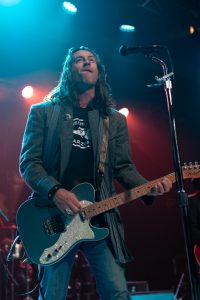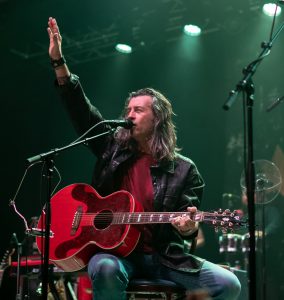Q&A: Roger Clyne on two decades of independence with The Peacemakers

Roger Clyne and the Peacemakers perform at the Van Buren in Phoenix, Ariz. on Dec. 29, 2018. Photos: Brent Hankins.
Roger Clyne never envisioned himself as a pioneer. Yet after a dispute with a record company led to the 1998 dissolution of his first band, The Refreshments, Clyne set out to blaze his own trail through the music industry. Under the moniker of Roger Clyne and the Peacemakers, the Tempe, Arizona native embarked on a career that has allowed him the freedom to explore his artistry without the interference of executives whose only concern is the bottom line.
Twenty years later, Clyne and his band have released eight albums, established their own music festival in Puerto Peñasco, Mexico and launched their own brand of tequila. A self-proclaimed road warrior, Clyne tours throughout the year and never tires of being onstage, whether it’s with The Peacemakers or Three Amigos, a side project that includes Johnny Hickman of Cracker and Peacemaker Jim Dalton.
To close out 2018, the Peacemakers celebrated 20 years together with a Phoenix show that saw the bar run out of tequila.
“That happens with way more frequency than I’d like it to. But the solution is just ‘buy more tequila,'” Roger Clyne said, laughing.
We spoke with Clyne shortly after a February performance with Three Amigos, and just ahead of a hometown appearance at the Innings Festival in Tempe.
RIFF: You were just onstage with Johnny Hickman and Jim Dalton as the Three Amigos the other night. Is that a sporadic sort of thing, or something the three of you do regularly?
Roger Clyne: Regularly, yes, but it’s only an annual event. Up to this point it was always in Colorado, but it’s been really fun and successful, and we just wanted to try it out in a different zip code. It was a really warm reception and a great crowd—a sellout at the Crescent Ballroom—so by all measures it was a really good thing.
You’re known best for Roger Clyne and Peacemakers, but how did this other band materialize?
Roger Clyne: It was an accidental; natural evolution. I used to go play Telluride at a thing called Arizona Days in February—the band typically takes February off—and got invited to come to Road 34 in Fort Collins. Johnny Hickman lives in Fort Collins, and I think the club owner asked if the Hickman-Dalton Gang could open. This was before Jim Dalton was in my band, and I was like “of course, I’m a fan of The Railbenders and Cracker,” and I knew both of those guys. …
One thing led to another. They would open and then go offstage for an hour and a half and get super drunk [laughs], and then join me at the end. And it turned out that the inclusion of them at the end of the show was more fun than me just playing solo, so we just got rid of the solo idea and called it Three Amigos. It happened over the course of about four or five years … and finally we just said “screw it, let’s all get together as one band,” and that’s when it really started to gel. I think the Phoenix show was like our 13th year of doing it.
You’ve had an amazing run, first with The Refreshments and then with The Peacemakers. What prompted you to leave the record company behind and strike out on your own?
Roger Clyne: I’ll try to give you the short answer: I didn’t like the way we were getting treated, which sounds sort of bratty. The Refreshments got a really great first shake with the record company [Mercury], and it kind of spoiled me on the way bands should be treated. … Halfway through our tenure with them, which was only about three or four years, the staff was replaced when the company was sold to Seagram’s. When that happened, I think we ended up getting treated sort of like the average band does: “Maybe you’ll get some promotion, maybe you’ll get some artistic license” … instead of “You guys are doing a great job, let’s just put all of our resources behind you.” …
So I kind of forced the hand of the record company when our option period was up, which is the date when the record company is supposed to extend your contract and commit to another couple of records. … They said “let us have 90 days to evaluate whether or not you guys are going to succeed at retail and radio, and if you do, then we’ll sign you.” … I said, “you make up your mind now, under the same auspices that this company signed us two and a half years ago, or you let us go.” … So they dropped us.
At that point, the band had chinks in our armor, both personal and professional, and you can get caught up on those in a documentary called Here’s to Life. Essentially, we broke up the band, and I was addicted to being an artist—it’s just what I felt like I should be doing. We fielded offers from the other record companies for this quote-unquote follow-up project, which became Roger Clyne and the Peacemakers, and those offers were terrible. So we just decided to go back to what we were doing before, and we turned our back on that industry.
It was terrifying, but what drove the decision was a refusal to be immersed, caught in, restricted by and imprisoned by a system that doesn’t allow you to express yourself the way you should—commercially or artistically. So we found the only other direction we could, and that’s what became “independence” before “independence” was really a term.
Have any of the record labels come calling to bring you back into the fold in the years since you went your own way?
Roger Clyne: I wish I could say yes. There have been a few flirtations, but our reputation is that we’re “ferociously independent.” I keep hearing that. It drives off a lot of suitors, which is probably really good for us in the end, so we just stay the course.
You’ve got a hugely dedicated group of fans, and you’ve shared the stage with some legendary performers. Didn’t Alice Cooper introduce you at his Christmas Pudding show as one of his favorite bands?
Yeah, that’s indelible for me. That was an amazing moment. … It’s quite the honor to be held in that regard by people like that, or by people I don’t even know. And the way we live up to it is to just keep art at the forefront of commerce, and make our connection to the audience from the stage, with the music. That’s our job.
Now, how we cobble together our commerce behind it is also our job, and we’ve been lucky enough to summon the business acumen to muddle through. But everything that we do begins with the art, begins with the song, begins with the band, begins with all that. And we never forget that we’re broadcasting to an audience, and that audience is our community. It’s a sacred duty.
You’re still very much tied to your roots. There are songs that you recorded more than 20 years ago as The Refreshments that are still part of your live show, and it’s great to see audiences still responding to those.
Roger Clyne: I wouldn’t do it if it weren’t still fun. Upon occasion, I’ll rest a song from the more vintage catalog stuff, but it doesn’t take long for me to start missing it. And when I start missing it, I’ll re-engage with it, and I think that translates back to the audience as enthusiasm.
You always seem to draw great crowds here in Arizona. Is there something a little more exciting or special about playing a show here?
Roger Clyne: Yeah, it’s always sort of a homecoming. It’s really great to play where you came from, and where you feel the pulse of your roots. The place connects you with your history and it’s all there at once—there really is a special magic to it. The day I don’t get a little bit of cold feet about it, is not a good day, because I’m always a little bit more nervous playing to our home state than I am about going out of state.
Out of state, you’re like a raiding party, you’re conquering; right? You’re out there to prove a point, so you get in there, you slash and burn and hopefully leave everybody breathless and swooning. But when you do it in your hometown, you’ve gotta reconnect with your history and do the place honor, because we’re from here—and we’re proudly from here. So I always take it very seriously when we’re preparing for a hometown performance.
Have you started working on a new record, or are you just focused on touring for right now?
Roger Clyne: It’s a little of both, actually. I’m actively in the process of songwriting right now, so I have a handful of tunes that I’m hoping to show to the band—and to an audience—pretty soon. So I’m into the next writing cycle, which is always a thrill. It’s a labor of love, it’s an incredibly joyful and painful process; a little self-help and self-discovery, and you hope that it’s a communication that will cross to other hearts and minds and souls. I’ve got a back pocket full of about a half dozen tunes, and we’re gonna be touring this year, so I’m just going to try to balance the two.
Follow Brent Hankins at Twitter.com/mistermainevent and Instagram.com/greatwidenowhere.


